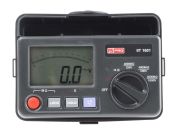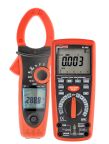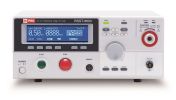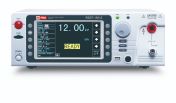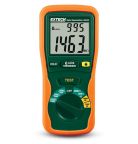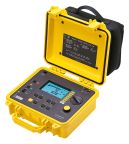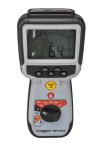Insulation Testers
Insulation testers are electrical measurement test tools used for preventive or predictive maintenance programs. Also known as megohmmeters they are designed to identify potential equipment failures before they occur. Insulation resistance testers are perfect for testing a wide range of high voltage equipment including switchgear, motors, generators and cables.
RS offer a range of high-quality electrical test tools from leading brands including Megger, Fluke, Chauvin Arnoux, Keysight Technologies, Metrohm, FLIR and of course RS PRO.
We also offer an in-house calibration service. See here for more detailed calibration services.
Types of Insulation Testers
Insulation testers are typically handheld devices but can be portable with a handle or bench mounted. Testers usually have an LCD or digital display, but some have the more traditional analogue needle such as the Megger MIT310A.
Handheld Devices: Handheld insulation testers are compact and easy to carry, making them ideal for quick checks and on-the-go testing in various locations. Their portability allows for convenient use in tight spaces or on field sites.
Portable with Handle: A heavier duty insulation tester with a handle, beneficial for field applications where durability and ease of transport are crucial. The handle provides extra grip and stability, especially in challenging environments.
Bench Mounted: Bench mounted insulation testers are designed for stationary use, providing high precision and stability. They are perfect for laboratory settings where precise and repeatable measurements are necessary.
Display Types: Digital insulation testers with LCD displays offer easy-to-read results and can include advanced features like data logging. In contrast, analogue insulation testers with needle displays provide a simple, reliable reading method, though they might be harder to read in low-light conditions. Digital displays are user-friendly and accurate, while analogue displays are preferred for their simplicity and lack of dependency on batteries.
How Insulation Testers Work
Testing the integrity of insulation involves using an insulation resistance tester to measure the resistance to current flow across the insulation material. These testers apply a high voltage and low current DC charge to the insulation, which allows them to measure the material's resistance. A high resistance reading indicates that very little current is escaping through the insulation, suggesting good insulation quality. Conversely, a low resistance reading points to significant current leakage, indicating potential insulation breakdown.
To interpret the readings on an IR tester or megohmmeter insulation tester, you need to know what constitutes good versus poor insulation quality. High resistance readings, usually in the range of megohms (MΩ), signify good insulation, as they show that the insulation is effectively preventing current leakage. Low resistance readings suggest poor insulation quality and potential issues, as they indicate that current is leaking through the insulation. Regular testing and monitoring of these readings help ensure the reliability and safety of electrical systems.
Impact of Current Loss
Causes of Current Leakage:
- Insulation Breakdown: Insulation materials can deteriorate over time due to environmental factors such as heat, moisture, and chemical exposure. This breakdown allows current to escape from its intended path, causing leakage. Using an electrical safety tester can help identify areas where insulation has degraded.
- Faulty or Aged Components: Over time, electrical components can wear out or fail. Aged or defective parts may not hold up under normal operating conditions, leading to current leakage. Regular maintenance with a high voltage equipment tester can help detect faulty components early.
- Improper Installation: Incorrect installation practices, such as poorly connected wires or inadequate insulation, can lead to current leakage. Ensuring proper installation practices and thorough testing can prevent this issue.
Consequences of Current Leakage:
- Safety Hazards: Current leakage poses significant safety risks, including electric shocks to personnel. It is crucial to regularly use an electrical safety tester to detect and mitigate these hazards.
- Equipment Damage: Leakage current can cause damage to sensitive electrical equipment, leading to malfunctions or failures. Regular testing with a high voltage equipment tester can help protect equipment from such damage.
- Energy Loss: Leakage currents result in energy being wasted, which can lead to increased operational costs. Identifying and rectifying leakage issues can help conserve energy and reduce expenses.
- Electrical Fires: One of the most severe consequences of current leakage is the potential for electrical fires. Faulty insulation or components that allow current to leak can generate heat and sparks, igniting surrounding materials and causing fires.
Understanding the causes and consequences of current leakage highlights the importance of regular testing and maintenance using tools like electrical safety testers and high voltage equipment testers to ensure safety and reliability in electrical systems.
Quality Insulation Testers at RS Philippines
For reliable and high-quality insulation testers, look no further than RS Philippines. We offer a comprehensive range of insulation testers, including both insulation testers and IR testers, perfect for any application. Ensure your electrical systems are safe and efficient by using the best safety testing equipment available.
Explore our selection of insulation testers in the Philippines, and find the right tools to meet your needs. Contact us today for more information or to place an order!
Popular Searches
Related links
- Fluke 1537/APAC Insulation Resistance Tester 2500V Max
- Fluke 1555 Insulation Resistance Tester 10000V Max CAT III 1000 V, CAT IV 600 V
- Earth Testers
- Megger 1012-063 Insulation Tester Case, For Use With MTR105 Rotating Machine Tester
- Megger MIT430 2 Insulation Tester 1000V Max CAT IV
- Megger MIT485 Insulation Tester 500V Max CAT IV
- Megger MIT515 Insulation Tester 5000V Max CAT IV
- Megger MIT525 Insulation Tester 5000V Max CAT IV


